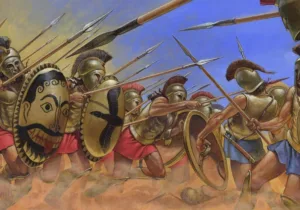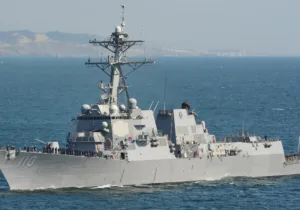Eighty years ago this week, FDR and a visiting Churchill lighted the National Christmas Tree and attended church together at DC’s Foundry Methodist. Churchill noted it was the first time he heard the hymn “O Little Town of Bethlehem.”
The world’s dictators, whose domains stretched from Spain to Japan, celebrated the season differently, plotting conquest and mass murder. Nazi armies were outside Moscow, where Stalin was fighting for survival. Japan was solidifying conquest of East Asia. Hong Kong surrendered on Christmas Day. Mussolini’s forces were fighting the British in Italian occupied Libya.
Mussolini disdained Christmas for honoring “the birth of a Jew who gave to the world debilitating and devitalizing theories, and who especially contrived to trick Italy through the disintegrating power of the Popes.” He tried to minimize and paganize the holiday, preferring Rome’s pre-Christian heritage.
Nazi Germany maybe more successfully paganized Christmas, replacing the traditional Nativity with ancient Germanic symbols commemorating winter solstice and the deity Odin. Hitler hosted a massive holiday party on December 18 in Munich with hundreds of Nazi officers and soldiers amid candles, decorated trees and swastikis. Photos show him looking glum. It was not his sort of holiday. And maybe he intuited, even at the height of his power, that his fortunes were about to shift, after declaring war on America while now entrapped in a Russian winter.
Stalin had long since abolished Christmas in the atheist Soviet Union, which tried to replace it with a secular New Year’s Day. Amid the crisis he had loosened restrictions on churches to animate Russian patriotism. In December 1941 he did not yet know whether Moscow or even his country could be retained. His dire predicament owed partly to his insane mass murders, state orchestrated famines and mass relocations before the war, which decimated the Soviet officer corps and ensured that many Soviets at least initially welcomed the Germans as liberators.
For millions of Soviets living under German occupation, there was now the brief opportunity to celebrate Christmas again, before the Nazis implemented their own genocidal plans against their Slavic subjects. Some Soviets collaborated with their Nazi overlords in implementing the Holocaust against millions of Soviet Jews, who, before the gas chambers, were shot into open ditches thousands at a time.
Japan’s unfolding conquests in the Pacific would also entail mass murder, if less systematic, for their millions of new subjects. In the Philippines, Manila was surrendered on December 26 as U.S. and Filipino forces withdrew into Bataan and Corregidor to await their doom. Western garrisons throughout Southeast Asia prepared for further onslaught and likely surrender, followed by several years of ghastly internment in Japanese camps, where Christmas spirit would be meager.
There was little in the world about which to be hopeful 80 years ago in December 1941. Churchill had rejoiced at America’s December 8 entrance into the war, which he saw as Britain’s salvation, and prompting his dramatic December 23 arrival in Washington, DC. From the White House balcony on Christmas Eve, as he and FDR remotely lighted the Christmas tree on the Ellipse, Churchill broadcast to America and the world:
I feel a sense of unity and fraternal association which, added to the kindliness of your welcome, convinces me that I have a right to sit at your fireside and share your Christmas joys. This is a strange Christmas Eve. Almost the whole world is locked in deadly struggle, and, with the most terrible weapons which science can devise, the nations advance upon each other.
Churchill called for at least a moment of Christmas celebration before steeling for grim times ahead:
Let the children have their night of fun and laughter. Let the gifts of Father Christmas delight their play. Let us grown-ups share to the full in their unstinted pleasures before we turn again to the stern task and the formidable years that lie before us, resolved that, by our sacrifice and daring, these same children shall not be robbed of their inheritance or denied their right to live in a free and decent world.
In introducing Churchill, FDR asked:
How can we pause, even for a day, even for Christmas Day, in our urgent labor of arming a decent humanity against the enemies which beset it? How can we put the world aside, as men and women put the world aside in peaceful years, to rejoice in the birth of Christ?
Noting he had designated New Year’s Day for national prayer, which he and Churchill would honor by worshipping at George Washington’s Christ Episcopal Church in Alexandria, FDR concluded:
Our strongest weapon in this war is that conviction of the dignity and brotherhood of man which Christmas Day signifies-more than any other day or any other symbol. Against enemies who preach the principles of hate and practice them, we set our faith in human love and in God’s care for us and all men everywhere.
Here’s important teaching from FDR relevant today and always to have faith in divine care for universal humanity and the human love flowing from it. This divine care includes, as Churchill noted, a “right to live in a free and decent world.”
The struggle for that free and decent world never ends this side of the parousia. But Christmas heralds the ultimate victory for decency and righteousness, about which FDR and Churchill were confident, and about which clueless dictators, among other malefactors, are always surprised.







 Sponsor a student for Christianity & National Security 2024
Sponsor a student for Christianity & National Security 2024